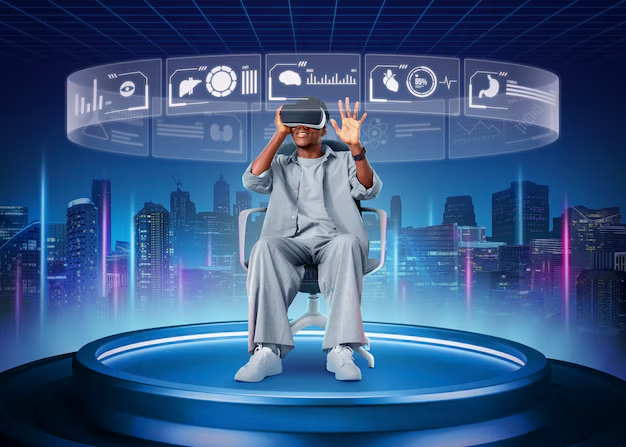
1. Introduction to Emerging Technologies
The rapid evolution of AI, Blockchain, and 5G in 2024 is changing the way industries operate, offering new possibilities and transforming traditional business models. While each of these technologies is powerful on its own, their convergence is where the real magic happens, allowing for smarter automation, more secure decentralized systems, and unprecedented levels of connectivity.
Businesses and governments alike are beginning to realize that staying competitive in this new era requires not just adopting these technologies but embracing their potential to innovate across all areas of operation. From automating mundane tasks with AI to leveraging Blockchain for transparent, tamper-proof records and using 5G for lightning-fast connectivity, the future is unfolding in real time. But with innovation comes challenges—ethics, scalability, security, and regulation are issues that must be addressed to maximize these technologies’ positive impact.
2. Artificial Intelligence (AI): Automating the Future
Artificial Intelligence (AI) continues to dominate discussions around innovation in 2024. AI’s capability to mimic human thought processes, automate tasks, and learn from vast amounts of data is driving transformative change across industries. From healthcare to automotive, AI is streamlining operations, improving customer experiences, and enabling new forms of innovation that were previously unimaginable.
AI in Business Operations
In 2024, businesses are using AI to optimize operations and boost productivity. AI-driven automation is transforming everything from customer service through AI chatbots and virtual assistants, to supply chain management with predictive analytics that forecast demand and minimize operational disruptions.
For instance, machine learning algorithms analyze large datasets in real time, providing actionable insights that help companies make better decisions. AI-powered Robotic Process Automation (RPA) reduces the need for manual labor in repetitive tasks, allowing companies to cut costs and reduce human error.
Keywords: AI automation, AI in business, AI predictive analytics, Robotic Process Automation (RPA)
AI-Powered Healthcare Innovations
AI is revolutionizing healthcare by improving diagnostics, personalizing treatments, and predicting outcomes. AI-powered medical imaging tools can detect diseases earlier and more accurately than traditional methods. In 2024, personalized medicine is becoming more common, with AI algorithms analyzing patient data and genetic information to tailor treatments specifically for individuals.
In addition, AI-driven drug discovery is speeding up the process of finding new treatments by analyzing vast amounts of biomedical data. With AI, the healthcare industry is moving toward a future where precision and efficiency are at the forefront.
Keywords: AI in healthcare, AI medical imaging, AI personalized medicine, AI drug discovery
AI’s Role in Autonomous Vehicles and Smart Cities
The development of autonomous vehicles is accelerating with the help of AI, enabling real-time decision-making for navigation, collision avoidance, and route optimization. AI’s ability to analyze complex environments and adapt to changing conditions makes it an essential component of the self-driving revolution. Meanwhile, smart cities are utilizing AI to optimize traffic management, reduce energy consumption, and enhance public safety.
Keywords: AI autonomous vehicles, AI smart cities, AI traffic management, AI self-driving cars
AI’s Ethical Challenges
Despite its tremendous potential, AI presents significant ethical challenges. Issues such as bias in algorithms, data privacy, and the lack of transparency in AI decision-making processes are becoming increasingly important. In 2024, businesses and governments must navigate these ethical concerns by establishing robust governance frameworks that ensure fairness, accountability, and transparency in AI systems.
Keywords: AI ethics, AI bias, AI transparency, AI regulation
3. Blockchain: Trust and Decentralization in the Digital Age
Blockchain technology, once primarily associated with cryptocurrencies, has evolved into a powerful tool for securing data, decentralizing systems, and building trust. In 2024, Blockchain is being integrated across multiple industries, transforming everything from finance to supply chain management.
Blockchain’s Impact on Finance and Decentralized Finance (DeFi)
Decentralized Finance (DeFi) is one of the most significant blockchain innovations of 2024. By eliminating intermediaries, DeFi platforms enable users to borrow, lend, and trade assets directly, reducing transaction costs and increasing financial inclusivity. Tokenization is also gaining momentum, allowing for fractional ownership of real estate, art, and other assets, which increases liquidity and market accessibility.
Keywords: Blockchain finance, decentralized finance (DeFi), tokenization, blockchain trading
Blockchain Beyond Crypto: Supply Chains, Real Estate, and Healthcare
Blockchain’s ability to create secure, tamper-proof ledgers makes it an ideal solution for supply chain management. Companies are using blockchain to track the origin and journey of products, ensuring transparency and authenticity. In real estate, smart contracts are automating property transactions, while the healthcare sector is adopting blockchain to protect patient data and ensure the integrity of medical records.
Keywords: Blockchain supply chain, blockchain real estate, blockchain healthcare, smart contracts
Smart Contracts and Automation
Smart contracts are revolutionizing industries by automating processes that once required intermediaries. These self-executing contracts are written in code and automatically enforce the terms of an agreement when conditions are met. From finance to real estate, smart contracts are reducing costs, improving efficiency, and enhancing security.
Keywords: Smart contracts, blockchain automation, blockchain contracts, blockchain efficiency
Addressing Blockchain’s Scalability and Energy Efficiency Challenges
Despite its promise, blockchain faces challenges with scalability and energy consumption. In 2024, solutions such as proof-of-stake (PoS) and layer 2 scaling are being explored to address these issues, making blockchain more scalable, efficient, and environmentally sustainable.
Keywords: Blockchain scalability, proof-of-stake, blockchain energy consumption, layer 2 scaling
4. 5G: The Backbone of the Hyper-Connected World
5G technology is revolutionizing connectivity, making real-time interactions and massive data transfers more accessible than ever. In 2024, 5G is enabling everything from smart factories to immersive augmented reality experiences, driving innovation across a wide range of sectors.
5G’s Role in IoT and Industry 4.0
The Internet of Things (IoT) is expanding rapidly thanks to 5G. In 2024, industries are using 5G to connect machines, sensors, and devices in real time, enabling smart manufacturing and automated logistics. 5G’s low latency and high bandwidth are critical to Industry 4.0, where automation and data-driven operations are the norm.
Keywords: 5G IoT, 5G Industry 4.0, 5G smart manufacturing, 5G automation
Enhancing Consumer Experiences with 5G
5G is not just for industrial applications; it’s also enhancing consumer experiences. From ultra-fast mobile internet to immersive augmented reality (AR) and virtual reality (VR) experiences, 5G is unlocking new possibilities for entertainment, communication, and retail.
Keywords: 5G consumer experience, 5G mobile internet, 5G AR, 5G VR
Conclusion: Embracing Innovation in 2024
The convergence of AI, Blockchain, and 5G is setting the stage for a transformative future in 2024 and beyond. These technologies, when combined, offer unprecedented opportunities for businesses to innovate, automate, and decentralize their operations. However, along with these opportunities come challenges—ethical concerns, scalability, and regulatory hurdles—that must be addressed. As industries across the globe adopt these technologies, those that.
Conclusion: Embracing Innovation in 2024
The convergence of AI, Blockchain, and 5G is not just transforming individual sectors but reshaping the entire global economy. In 2024, these emerging technologies are driving the creation of smarter, more efficient, and more interconnected systems. They hold the potential to revolutionize industries by enhancing automation, decentralizing operations, and facilitating unprecedented levels of real-time communication and data processing.
AI continues to push the boundaries of what’s possible by automating tasks, improving decision-making, and enhancing personalized services across industries. However, the need for ethical regulation and transparency is crucial as AI becomes more ingrained in everyday business processes.
Blockchain, with its focus on trust and decentralization, is becoming more widely adopted in areas beyond cryptocurrency, such as supply chains, real estate, and healthcare. Its impact on finance, particularly through Decentralized Finance (DeFi), is transforming traditional financial systems, though challenges around scalability and energy efficiency need to be addressed.
5G, meanwhile, is enabling hyper-connectivity, facilitating the expansion of the Internet of Things (IoT) and empowering innovations like smart cities, autonomous vehicles, and immersive AR/VR experiences. The faster, more reliable data transfer provided by 5G is the backbone for many of the AI and Blockchain applications driving Industry 4.0.
As businesses and industries embrace these technologies, they will be better positioned to innovate, optimize their operations, and stay competitive in an increasingly digital world. However, success will require thoughtful strategies to address ethical concerns, security risks, and scalability challenges. The technological innovations of 2024 are just the beginning of a new era that promises to unlock endless possibilities.
For companies, governments, and individuals alike, the time to prepare for the future is now—by understanding, adopting, and leveraging these emerging technologies, we can all play a part in shaping a more intelligent, decentralized, and connected world.
